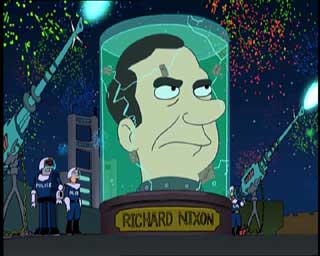"Author Of America"
I've added a for-real hardcover book to the "Worthwhile Reading" sidebar: Thomas Jefferson: Author of America by Christopher Hitchens. After I saw him give George Galloway a much-needed shallacking on the September 23rd episode of HBO's Real Time with Fidel Castro, I picked up his newest book at the Grand Junction Borders en route to Southern CA (pictures to come shortly).
It's fantastic. The most enjoyable read I've had this year. He distills Jefferson's biography (and to this point I didn't think such a feat was possible) to the salient events and motivations of his life, and actions and achievements of his administration. Even the book's tangents prove to be delightfully pertinent. Hitchens's first blockquote of the book is from Jefferson's final letter, addressed June 24, 1826 to express his regrets for missing the then-upcoming 50th anniversary celebration of the Declaration of Independence. Excerpt:
"May it be to the world, what I believe it will be (to some parts sooner, to others later, but finally to all), the signal of arousing men to burst the chains under which monkish ignorance and superstition had persuaded them to bind themselves, and to assume the blessings and security of self-government. That form which we have substituted restores the free right to the unbounded exercise of reason and freedom of opinion. All eyes are opened, or opening, to the rights of man. The general spread of the light of science has already laid open to every view the palpable truth, that the mass of mankind has not been born with saddles on their backs, nor a favored few booted and spurred, ready to ride them legitimately, by the grace of God. These are grounds of hope for others. For ourselves, let the annual return of this day forever refresh our recollections of these rights, and an undiminished devotion to them."
It's one of those rare quotes that clarifies this nation's purpose and inspirational objectives in such a way that itself inspires. If those noble ideas remained the focus of Independence Day today, rather than the celebration itself, or if they even could claim their rightful place at the center of American rhetoric still, I think there would be a greater base of public understanding for our need to successfully deliver democracy to where it is needed most, and to extend all liberties too all citizens, especially those of our own country.
Hitchens later states:
"He [Jefferson] trenchantly restated the view that the American Revolution was founded on universal principles, and was thus emphatically for export. He laid renewed stress on the importance of science and innovation as the spur of the Enlightenment, and scornfully contrasted this with mere faith and credulity."
He also interjects the famous Lincoln quote:
"All honor to Jefferson: to the man who, in the concrete pressure of a struggle for national independence by a single people, had the coolness, forecast and capacity to introduce into a merely revolutionary document an abstract truth, applicable to all men and all times, and so to embalm it there, that today, and in all coming days, it shall be a rebuke and a stumbling-block to the very harbingers of reappearing tyranny and oppression."
The author doesn't shie away from the hypocrisy of Jefferson's repeated assertions of inalienable human rights and his ownership of slaves; in fact he discusses it throughout the book. But, upon introducing the issue, he dispenses with its controversy in a very satisfying manner:
"... It would be lazy or obvious to say that he [Jefferson] contained contradictions or paradoxes. This is true of everybody, and everything. It would be infinitely more surprising to strike upon a historic figure, or indeed a nation, that was not subject to this law."
I've already babbled more than needed, but it suffices to say that I recommend this book as an engaging (and brief) read. It's worth the $20.


<< Home